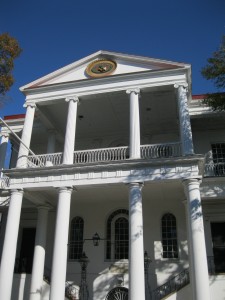 Charleston is considered to be among the most well-dressed and best-mannered cities in America, and this is a tradition that has largely been held sacred in the many historic societies that grace the old city.
Charleston is considered to be among the most well-dressed and best-mannered cities in America, and this is a tradition that has largely been held sacred in the many historic societies that grace the old city.
One of the most famed societies is the St. Cecilia Society, created in 1762 and named for the patron saint of music. The old society includes Charleston’s most elite families, and the membership is limited only to those who are directly descended from the 18th century organization. The St. Cecilia’s annual ball is a white-tie and tails/long gown affair in which dinner is served at midnight, followed by hours of formal dancing.
Two benevolent societies, the 1737 South Carolina Society and the 1748 St. Andrews Society, share the same hall at 70 Meeting Street. South Carolina Society Hall was built by descendants of French Huguenots in the early 1800’s, and they offered to share the roof with their Scottish Presbyterians brethren after fired claimed the old St. Andrews Society hall on Broad Street in 1861. The building features atop its grand portico, the South Carolina Society motto “posteritati”, meaning “future generations”, with the symbol of a hand planting a seed. The seed that is largely planted for future generations today is the formal dance party, as dozens of “debutante” parties are held at the hall each Fall in which young women are formally introduced to society. There are also the annual Cotillion dances for younger children, who learn the manners and dress of genteel society.
The Deutsche Freundlische Gesellschaft, Societe’ Francaise and the Hibernian Society are all based on national German, French and Irish origins, and all have very honored traditions. Perhaps the most well-known and honored is the St. Patrick’s Day parade of the Hibernians, who have marched in their green garb since the mid 19th century.
Other societies with significant traditions include the Brown Fellowship Society, founded by Charleston’s free blacks in 1794; the New England Society, founded in 1819 by such newcomers to the city as Massachusetts native Samuel Finley Breese Morse, who created the famous Morse Code.
Some of the old societies and traditions have died over the years, such as the spirited meetings of the Philomathean Society of the early 19th century, which met in Stoll’s Alley and was dedicated to gathering gentlemen to debate intellectual issues of the day.
Most interesting of all names was the satirical Ugly Club, founded in the aftermath of the American Revolution by elite Charlestonians who met at the old Williams Tavern on Tradd Street to exchange eloquent and humorous insults. Their colorful salutation, read at the beginning of each meeting was :
“ Ugly mortals, hither haste, Enjoy our mirth, enjoy our feast,
Bring noses crooked, noses hooked,
Noses swollen, noses crooked,
But each must bring and homest heart,
Or bear this sentence – hence depart.
Charleston Social Traditions
